Analyzing Business Culture: Elements, Importance, and Business Studies
VerifiedAdded on 2023/06/13
|11
|2734
|319
Essay
AI Summary
This essay explores the concept of business culture, defining it as a set of collective social norms, values, and rules accepted by a group of individuals. It highlights the importance of understanding cultural norms for effective business communication and strategy development. The essay distinguishes between low-context and high-context cultures, providing examples of countries belonging to each type. It outlines common business etiquettes for effective cross-cultural communication, emphasizing understanding differences, expressing gratitude, providing honest statements, and maintaining composure. Furthermore, the essay identifies key elements of a healthy business culture, including strong beliefs, demonstrated purpose, clarified objectives, mentored leadership, assessed accountability, and ownership. It also discusses the importance of business culture in fostering employee relationships, promoting healthy competition, providing a sense of direction, creating a unique brand image, unifying employees, and facilitating collaboration among diverse nationalities. Finally, the essay underscores the significance of business culture in business studies, emphasizing its role in understanding cultural differences, employee-management relationships, and overall organizational function.
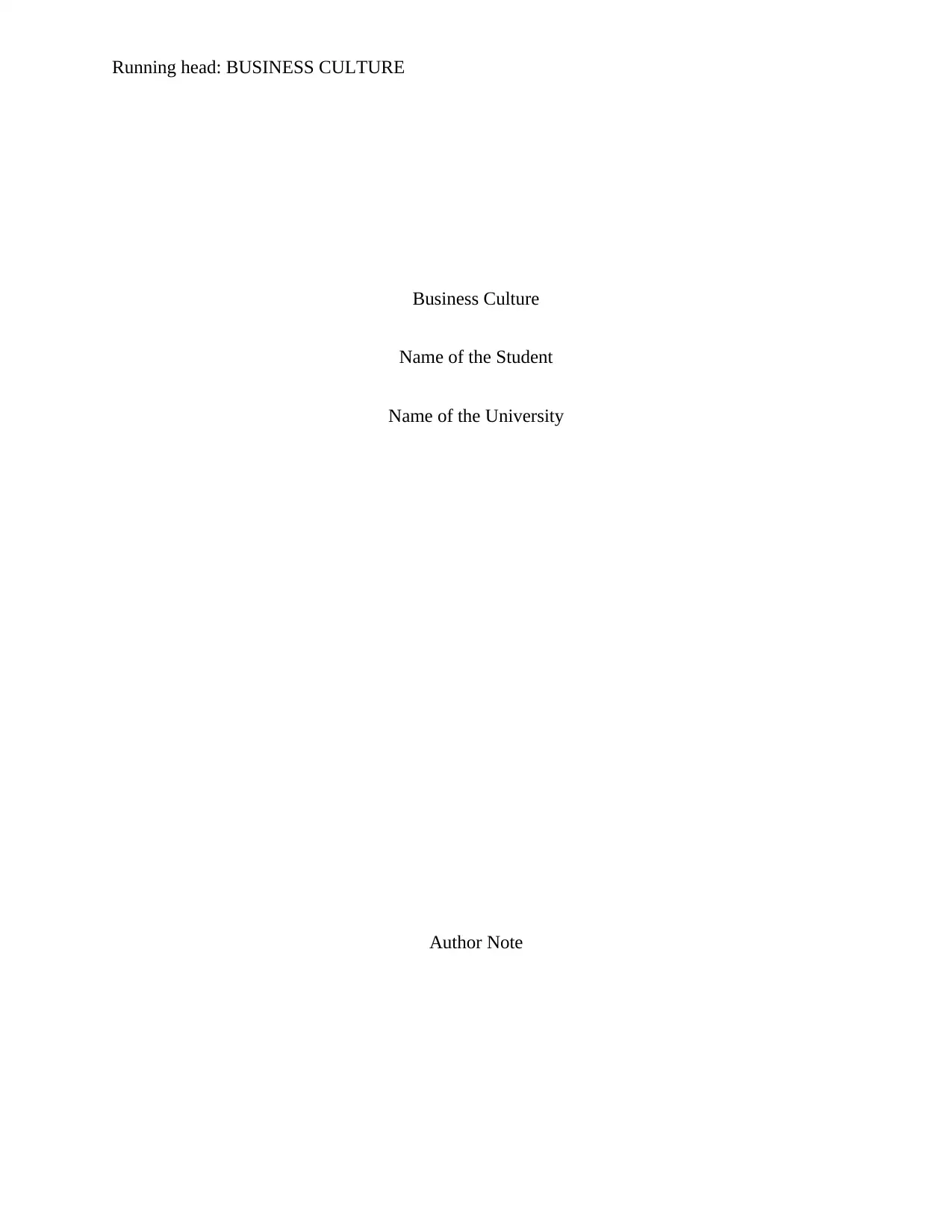
Running head: BUSINESS CULTURE
Business Culture
Name of the Student
Name of the University
Author Note
Business Culture
Name of the Student
Name of the University
Author Note
Paraphrase This Document
Need a fresh take? Get an instant paraphrase of this document with our AI Paraphraser
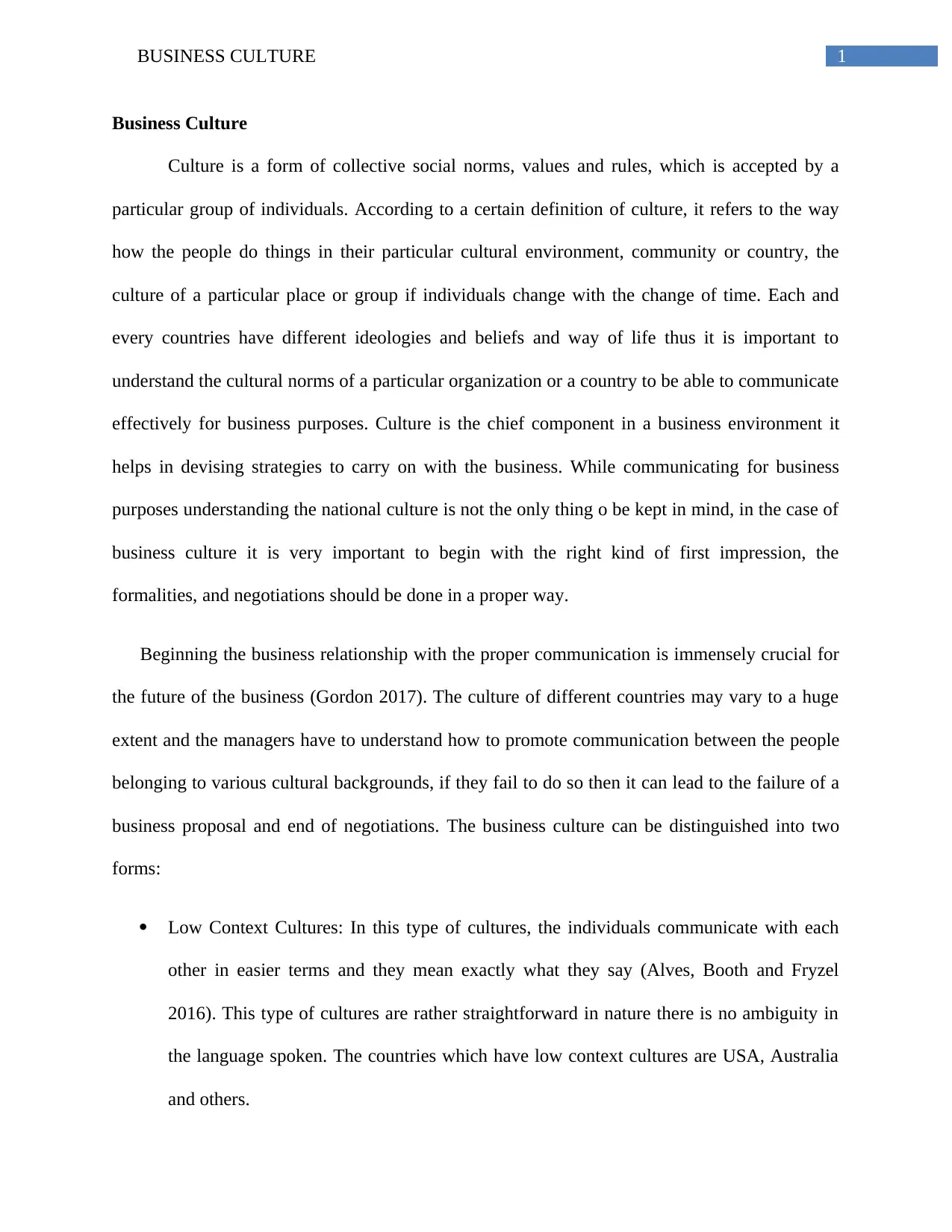
1BUSINESS CULTURE
Business Culture
Culture is a form of collective social norms, values and rules, which is accepted by a
particular group of individuals. According to a certain definition of culture, it refers to the way
how the people do things in their particular cultural environment, community or country, the
culture of a particular place or group if individuals change with the change of time. Each and
every countries have different ideologies and beliefs and way of life thus it is important to
understand the cultural norms of a particular organization or a country to be able to communicate
effectively for business purposes. Culture is the chief component in a business environment it
helps in devising strategies to carry on with the business. While communicating for business
purposes understanding the national culture is not the only thing o be kept in mind, in the case of
business culture it is very important to begin with the right kind of first impression, the
formalities, and negotiations should be done in a proper way.
Beginning the business relationship with the proper communication is immensely crucial for
the future of the business (Gordon 2017). The culture of different countries may vary to a huge
extent and the managers have to understand how to promote communication between the people
belonging to various cultural backgrounds, if they fail to do so then it can lead to the failure of a
business proposal and end of negotiations. The business culture can be distinguished into two
forms:
Low Context Cultures: In this type of cultures, the individuals communicate with each
other in easier terms and they mean exactly what they say (Alves, Booth and Fryzel
2016). This type of cultures are rather straightforward in nature there is no ambiguity in
the language spoken. The countries which have low context cultures are USA, Australia
and others.
Business Culture
Culture is a form of collective social norms, values and rules, which is accepted by a
particular group of individuals. According to a certain definition of culture, it refers to the way
how the people do things in their particular cultural environment, community or country, the
culture of a particular place or group if individuals change with the change of time. Each and
every countries have different ideologies and beliefs and way of life thus it is important to
understand the cultural norms of a particular organization or a country to be able to communicate
effectively for business purposes. Culture is the chief component in a business environment it
helps in devising strategies to carry on with the business. While communicating for business
purposes understanding the national culture is not the only thing o be kept in mind, in the case of
business culture it is very important to begin with the right kind of first impression, the
formalities, and negotiations should be done in a proper way.
Beginning the business relationship with the proper communication is immensely crucial for
the future of the business (Gordon 2017). The culture of different countries may vary to a huge
extent and the managers have to understand how to promote communication between the people
belonging to various cultural backgrounds, if they fail to do so then it can lead to the failure of a
business proposal and end of negotiations. The business culture can be distinguished into two
forms:
Low Context Cultures: In this type of cultures, the individuals communicate with each
other in easier terms and they mean exactly what they say (Alves, Booth and Fryzel
2016). This type of cultures are rather straightforward in nature there is no ambiguity in
the language spoken. The countries which have low context cultures are USA, Australia
and others.
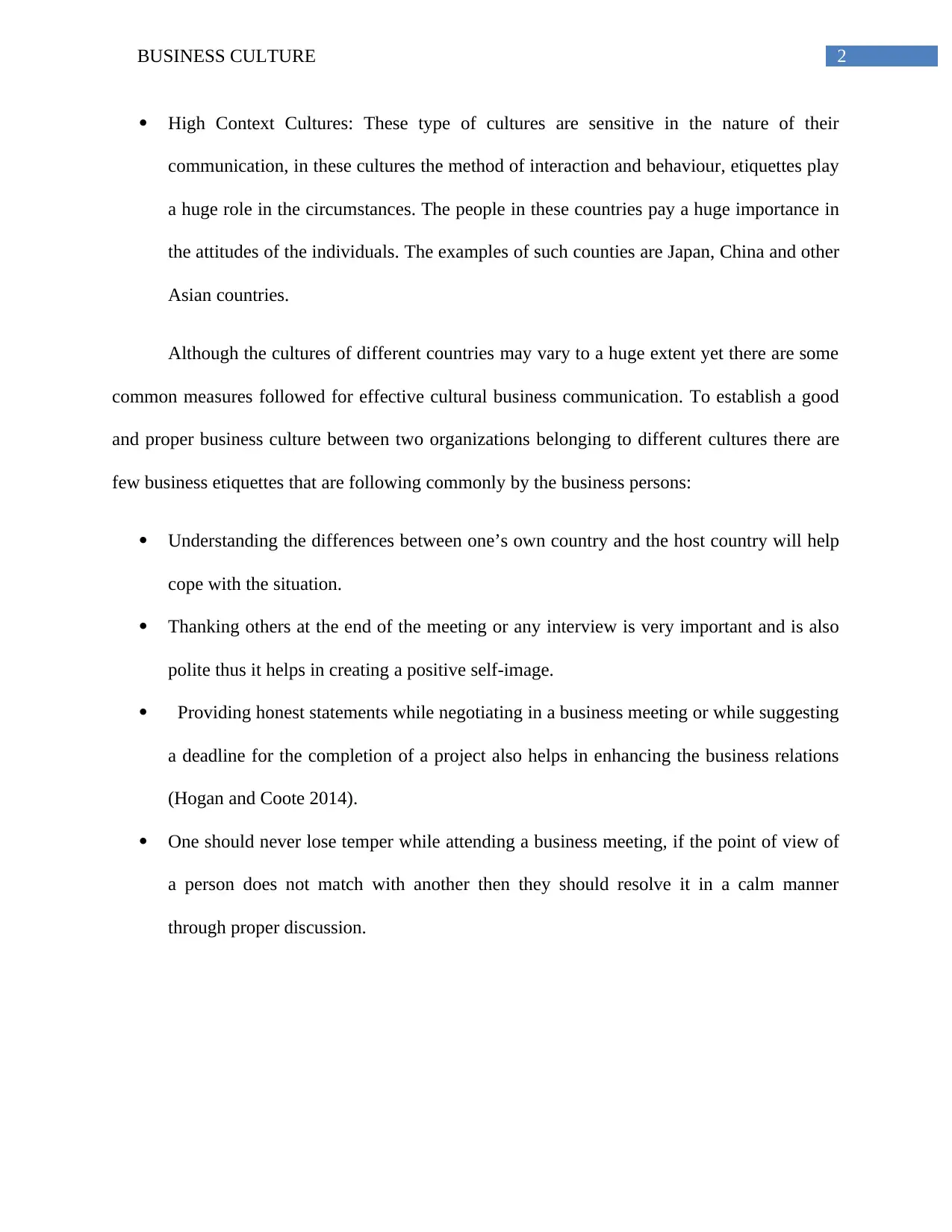
2BUSINESS CULTURE
High Context Cultures: These type of cultures are sensitive in the nature of their
communication, in these cultures the method of interaction and behaviour, etiquettes play
a huge role in the circumstances. The people in these countries pay a huge importance in
the attitudes of the individuals. The examples of such counties are Japan, China and other
Asian countries.
Although the cultures of different countries may vary to a huge extent yet there are some
common measures followed for effective cultural business communication. To establish a good
and proper business culture between two organizations belonging to different cultures there are
few business etiquettes that are following commonly by the business persons:
Understanding the differences between one’s own country and the host country will help
cope with the situation.
Thanking others at the end of the meeting or any interview is very important and is also
polite thus it helps in creating a positive self-image.
Providing honest statements while negotiating in a business meeting or while suggesting
a deadline for the completion of a project also helps in enhancing the business relations
(Hogan and Coote 2014).
One should never lose temper while attending a business meeting, if the point of view of
a person does not match with another then they should resolve it in a calm manner
through proper discussion.
High Context Cultures: These type of cultures are sensitive in the nature of their
communication, in these cultures the method of interaction and behaviour, etiquettes play
a huge role in the circumstances. The people in these countries pay a huge importance in
the attitudes of the individuals. The examples of such counties are Japan, China and other
Asian countries.
Although the cultures of different countries may vary to a huge extent yet there are some
common measures followed for effective cultural business communication. To establish a good
and proper business culture between two organizations belonging to different cultures there are
few business etiquettes that are following commonly by the business persons:
Understanding the differences between one’s own country and the host country will help
cope with the situation.
Thanking others at the end of the meeting or any interview is very important and is also
polite thus it helps in creating a positive self-image.
Providing honest statements while negotiating in a business meeting or while suggesting
a deadline for the completion of a project also helps in enhancing the business relations
(Hogan and Coote 2014).
One should never lose temper while attending a business meeting, if the point of view of
a person does not match with another then they should resolve it in a calm manner
through proper discussion.
⊘ This is a preview!⊘
Do you want full access?
Subscribe today to unlock all pages.

Trusted by 1+ million students worldwide
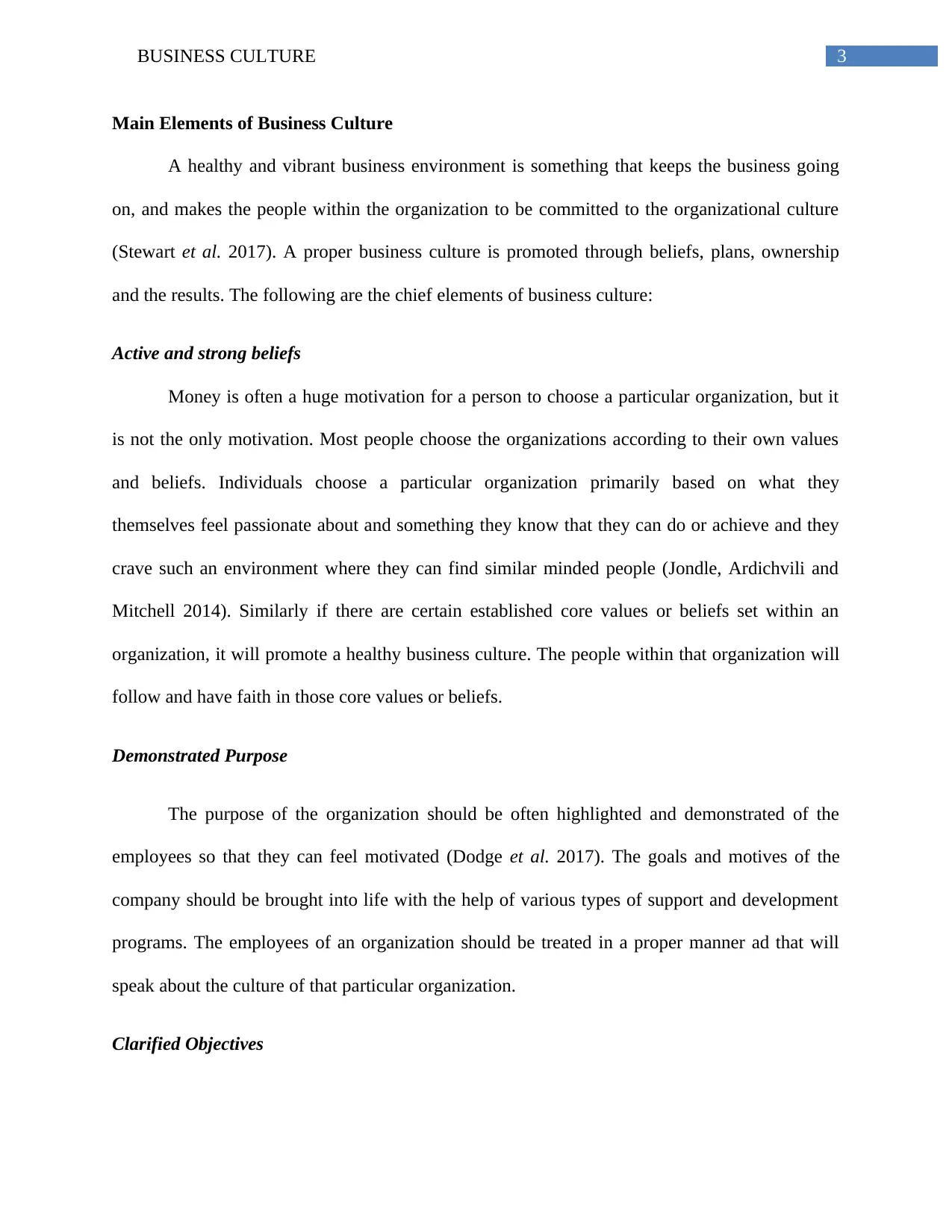
3BUSINESS CULTURE
Main Elements of Business Culture
A healthy and vibrant business environment is something that keeps the business going
on, and makes the people within the organization to be committed to the organizational culture
(Stewart et al. 2017). A proper business culture is promoted through beliefs, plans, ownership
and the results. The following are the chief elements of business culture:
Active and strong beliefs
Money is often a huge motivation for a person to choose a particular organization, but it
is not the only motivation. Most people choose the organizations according to their own values
and beliefs. Individuals choose a particular organization primarily based on what they
themselves feel passionate about and something they know that they can do or achieve and they
crave such an environment where they can find similar minded people (Jondle, Ardichvili and
Mitchell 2014). Similarly if there are certain established core values or beliefs set within an
organization, it will promote a healthy business culture. The people within that organization will
follow and have faith in those core values or beliefs.
Demonstrated Purpose
The purpose of the organization should be often highlighted and demonstrated of the
employees so that they can feel motivated (Dodge et al. 2017). The goals and motives of the
company should be brought into life with the help of various types of support and development
programs. The employees of an organization should be treated in a proper manner ad that will
speak about the culture of that particular organization.
Clarified Objectives
Main Elements of Business Culture
A healthy and vibrant business environment is something that keeps the business going
on, and makes the people within the organization to be committed to the organizational culture
(Stewart et al. 2017). A proper business culture is promoted through beliefs, plans, ownership
and the results. The following are the chief elements of business culture:
Active and strong beliefs
Money is often a huge motivation for a person to choose a particular organization, but it
is not the only motivation. Most people choose the organizations according to their own values
and beliefs. Individuals choose a particular organization primarily based on what they
themselves feel passionate about and something they know that they can do or achieve and they
crave such an environment where they can find similar minded people (Jondle, Ardichvili and
Mitchell 2014). Similarly if there are certain established core values or beliefs set within an
organization, it will promote a healthy business culture. The people within that organization will
follow and have faith in those core values or beliefs.
Demonstrated Purpose
The purpose of the organization should be often highlighted and demonstrated of the
employees so that they can feel motivated (Dodge et al. 2017). The goals and motives of the
company should be brought into life with the help of various types of support and development
programs. The employees of an organization should be treated in a proper manner ad that will
speak about the culture of that particular organization.
Clarified Objectives
Paraphrase This Document
Need a fresh take? Get an instant paraphrase of this document with our AI Paraphraser
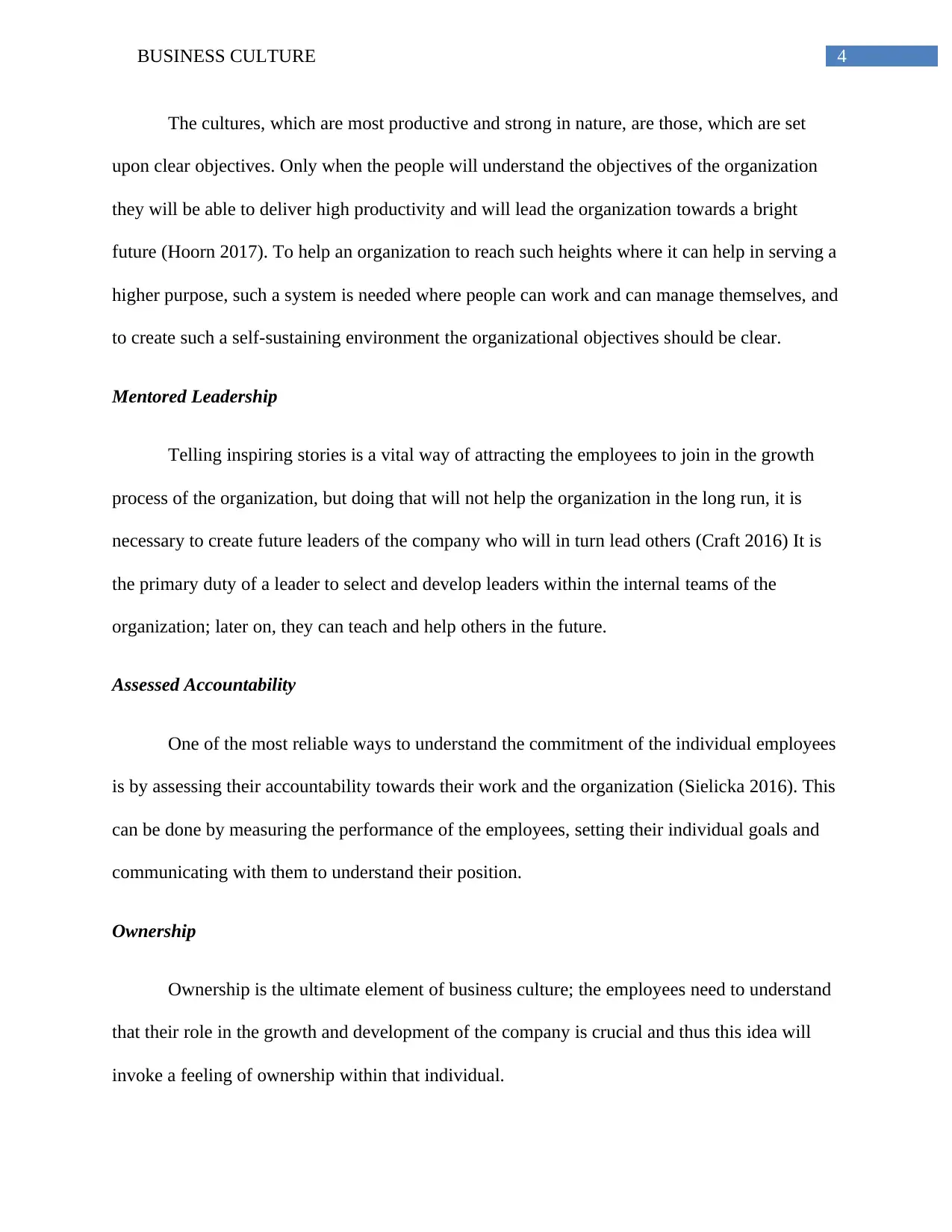
4BUSINESS CULTURE
The cultures, which are most productive and strong in nature, are those, which are set
upon clear objectives. Only when the people will understand the objectives of the organization
they will be able to deliver high productivity and will lead the organization towards a bright
future (Hoorn 2017). To help an organization to reach such heights where it can help in serving a
higher purpose, such a system is needed where people can work and can manage themselves, and
to create such a self-sustaining environment the organizational objectives should be clear.
Mentored Leadership
Telling inspiring stories is a vital way of attracting the employees to join in the growth
process of the organization, but doing that will not help the organization in the long run, it is
necessary to create future leaders of the company who will in turn lead others (Craft 2016) It is
the primary duty of a leader to select and develop leaders within the internal teams of the
organization; later on, they can teach and help others in the future.
Assessed Accountability
One of the most reliable ways to understand the commitment of the individual employees
is by assessing their accountability towards their work and the organization (Sielicka 2016). This
can be done by measuring the performance of the employees, setting their individual goals and
communicating with them to understand their position.
Ownership
Ownership is the ultimate element of business culture; the employees need to understand
that their role in the growth and development of the company is crucial and thus this idea will
invoke a feeling of ownership within that individual.
The cultures, which are most productive and strong in nature, are those, which are set
upon clear objectives. Only when the people will understand the objectives of the organization
they will be able to deliver high productivity and will lead the organization towards a bright
future (Hoorn 2017). To help an organization to reach such heights where it can help in serving a
higher purpose, such a system is needed where people can work and can manage themselves, and
to create such a self-sustaining environment the organizational objectives should be clear.
Mentored Leadership
Telling inspiring stories is a vital way of attracting the employees to join in the growth
process of the organization, but doing that will not help the organization in the long run, it is
necessary to create future leaders of the company who will in turn lead others (Craft 2016) It is
the primary duty of a leader to select and develop leaders within the internal teams of the
organization; later on, they can teach and help others in the future.
Assessed Accountability
One of the most reliable ways to understand the commitment of the individual employees
is by assessing their accountability towards their work and the organization (Sielicka 2016). This
can be done by measuring the performance of the employees, setting their individual goals and
communicating with them to understand their position.
Ownership
Ownership is the ultimate element of business culture; the employees need to understand
that their role in the growth and development of the company is crucial and thus this idea will
invoke a feeling of ownership within that individual.
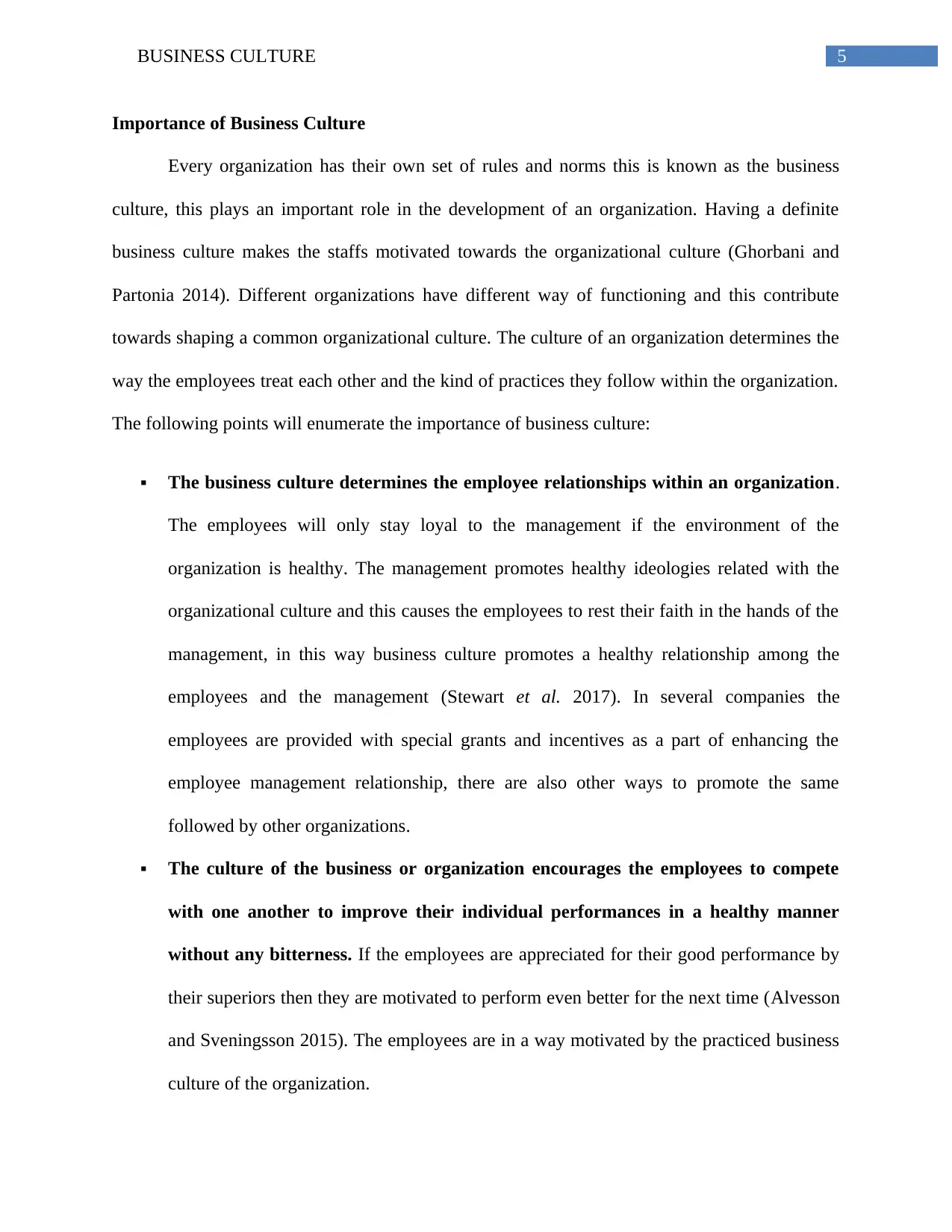
5BUSINESS CULTURE
Importance of Business Culture
Every organization has their own set of rules and norms this is known as the business
culture, this plays an important role in the development of an organization. Having a definite
business culture makes the staffs motivated towards the organizational culture (Ghorbani and
Partonia 2014). Different organizations have different way of functioning and this contribute
towards shaping a common organizational culture. The culture of an organization determines the
way the employees treat each other and the kind of practices they follow within the organization.
The following points will enumerate the importance of business culture:
The business culture determines the employee relationships within an organization.
The employees will only stay loyal to the management if the environment of the
organization is healthy. The management promotes healthy ideologies related with the
organizational culture and this causes the employees to rest their faith in the hands of the
management, in this way business culture promotes a healthy relationship among the
employees and the management (Stewart et al. 2017). In several companies the
employees are provided with special grants and incentives as a part of enhancing the
employee management relationship, there are also other ways to promote the same
followed by other organizations.
The culture of the business or organization encourages the employees to compete
with one another to improve their individual performances in a healthy manner
without any bitterness. If the employees are appreciated for their good performance by
their superiors then they are motivated to perform even better for the next time (Alvesson
and Sveningsson 2015). The employees are in a way motivated by the practiced business
culture of the organization.
Importance of Business Culture
Every organization has their own set of rules and norms this is known as the business
culture, this plays an important role in the development of an organization. Having a definite
business culture makes the staffs motivated towards the organizational culture (Ghorbani and
Partonia 2014). Different organizations have different way of functioning and this contribute
towards shaping a common organizational culture. The culture of an organization determines the
way the employees treat each other and the kind of practices they follow within the organization.
The following points will enumerate the importance of business culture:
The business culture determines the employee relationships within an organization.
The employees will only stay loyal to the management if the environment of the
organization is healthy. The management promotes healthy ideologies related with the
organizational culture and this causes the employees to rest their faith in the hands of the
management, in this way business culture promotes a healthy relationship among the
employees and the management (Stewart et al. 2017). In several companies the
employees are provided with special grants and incentives as a part of enhancing the
employee management relationship, there are also other ways to promote the same
followed by other organizations.
The culture of the business or organization encourages the employees to compete
with one another to improve their individual performances in a healthy manner
without any bitterness. If the employees are appreciated for their good performance by
their superiors then they are motivated to perform even better for the next time (Alvesson
and Sveningsson 2015). The employees are in a way motivated by the practiced business
culture of the organization.
⊘ This is a preview!⊘
Do you want full access?
Subscribe today to unlock all pages.

Trusted by 1+ million students worldwide
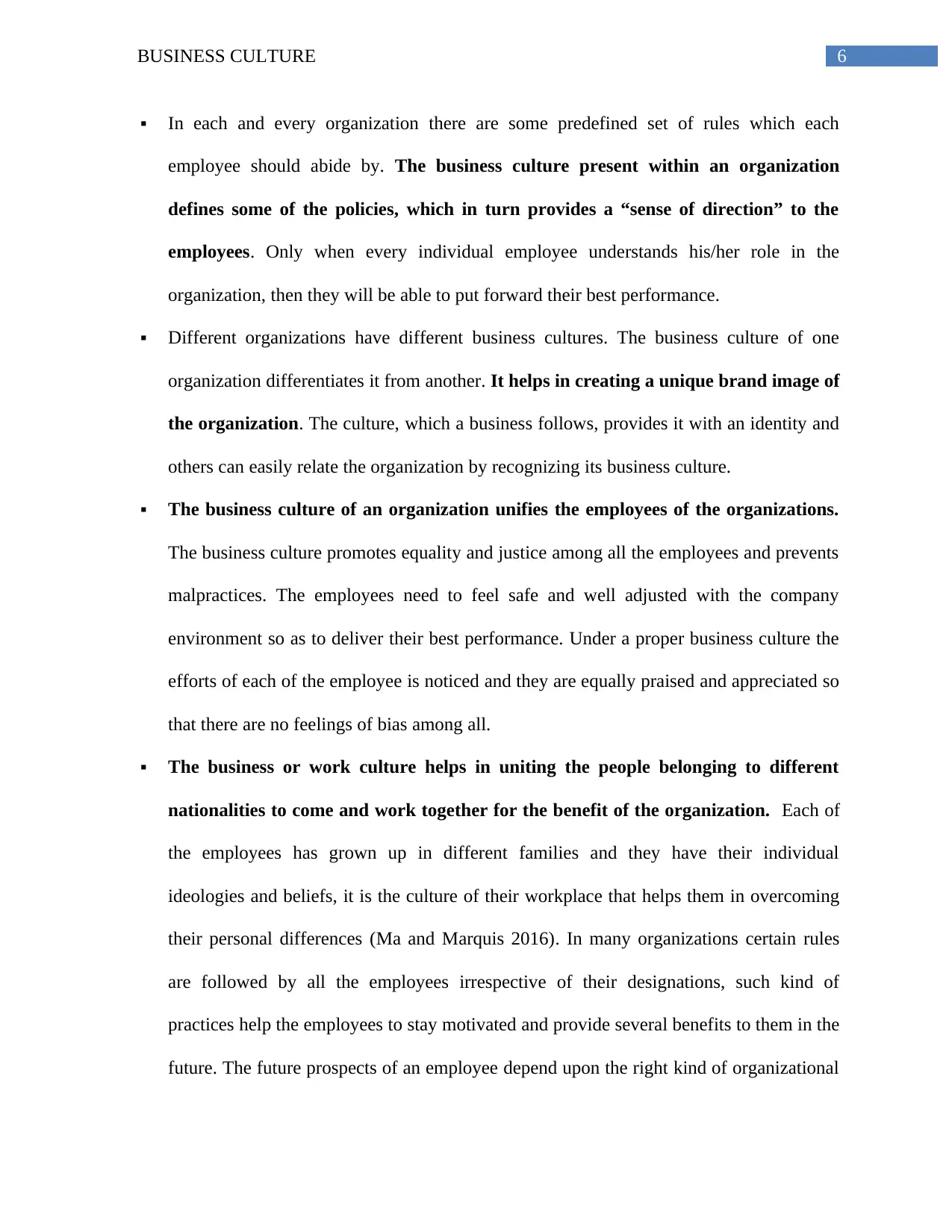
6BUSINESS CULTURE
In each and every organization there are some predefined set of rules which each
employee should abide by. The business culture present within an organization
defines some of the policies, which in turn provides a “sense of direction” to the
employees. Only when every individual employee understands his/her role in the
organization, then they will be able to put forward their best performance.
Different organizations have different business cultures. The business culture of one
organization differentiates it from another. It helps in creating a unique brand image of
the organization. The culture, which a business follows, provides it with an identity and
others can easily relate the organization by recognizing its business culture.
The business culture of an organization unifies the employees of the organizations.
The business culture promotes equality and justice among all the employees and prevents
malpractices. The employees need to feel safe and well adjusted with the company
environment so as to deliver their best performance. Under a proper business culture the
efforts of each of the employee is noticed and they are equally praised and appreciated so
that there are no feelings of bias among all.
The business or work culture helps in uniting the people belonging to different
nationalities to come and work together for the benefit of the organization. Each of
the employees has grown up in different families and they have their individual
ideologies and beliefs, it is the culture of their workplace that helps them in overcoming
their personal differences (Ma and Marquis 2016). In many organizations certain rules
are followed by all the employees irrespective of their designations, such kind of
practices help the employees to stay motivated and provide several benefits to them in the
future. The future prospects of an employee depend upon the right kind of organizational
In each and every organization there are some predefined set of rules which each
employee should abide by. The business culture present within an organization
defines some of the policies, which in turn provides a “sense of direction” to the
employees. Only when every individual employee understands his/her role in the
organization, then they will be able to put forward their best performance.
Different organizations have different business cultures. The business culture of one
organization differentiates it from another. It helps in creating a unique brand image of
the organization. The culture, which a business follows, provides it with an identity and
others can easily relate the organization by recognizing its business culture.
The business culture of an organization unifies the employees of the organizations.
The business culture promotes equality and justice among all the employees and prevents
malpractices. The employees need to feel safe and well adjusted with the company
environment so as to deliver their best performance. Under a proper business culture the
efforts of each of the employee is noticed and they are equally praised and appreciated so
that there are no feelings of bias among all.
The business or work culture helps in uniting the people belonging to different
nationalities to come and work together for the benefit of the organization. Each of
the employees has grown up in different families and they have their individual
ideologies and beliefs, it is the culture of their workplace that helps them in overcoming
their personal differences (Ma and Marquis 2016). In many organizations certain rules
are followed by all the employees irrespective of their designations, such kind of
practices help the employees to stay motivated and provide several benefits to them in the
future. The future prospects of an employee depend upon the right kind of organizational
Paraphrase This Document
Need a fresh take? Get an instant paraphrase of this document with our AI Paraphraser
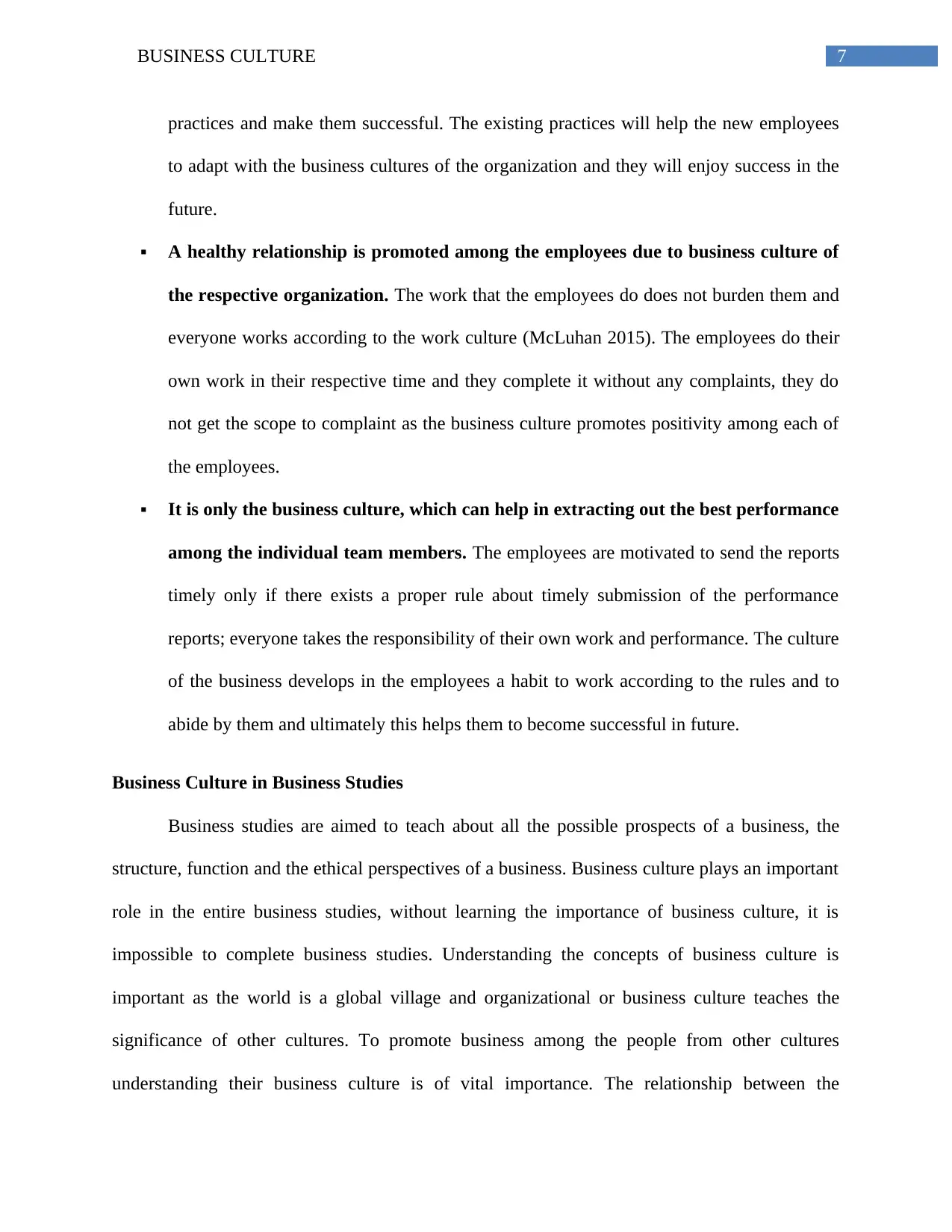
7BUSINESS CULTURE
practices and make them successful. The existing practices will help the new employees
to adapt with the business cultures of the organization and they will enjoy success in the
future.
A healthy relationship is promoted among the employees due to business culture of
the respective organization. The work that the employees do does not burden them and
everyone works according to the work culture (McLuhan 2015). The employees do their
own work in their respective time and they complete it without any complaints, they do
not get the scope to complaint as the business culture promotes positivity among each of
the employees.
It is only the business culture, which can help in extracting out the best performance
among the individual team members. The employees are motivated to send the reports
timely only if there exists a proper rule about timely submission of the performance
reports; everyone takes the responsibility of their own work and performance. The culture
of the business develops in the employees a habit to work according to the rules and to
abide by them and ultimately this helps them to become successful in future.
Business Culture in Business Studies
Business studies are aimed to teach about all the possible prospects of a business, the
structure, function and the ethical perspectives of a business. Business culture plays an important
role in the entire business studies, without learning the importance of business culture, it is
impossible to complete business studies. Understanding the concepts of business culture is
important as the world is a global village and organizational or business culture teaches the
significance of other cultures. To promote business among the people from other cultures
understanding their business culture is of vital importance. The relationship between the
practices and make them successful. The existing practices will help the new employees
to adapt with the business cultures of the organization and they will enjoy success in the
future.
A healthy relationship is promoted among the employees due to business culture of
the respective organization. The work that the employees do does not burden them and
everyone works according to the work culture (McLuhan 2015). The employees do their
own work in their respective time and they complete it without any complaints, they do
not get the scope to complaint as the business culture promotes positivity among each of
the employees.
It is only the business culture, which can help in extracting out the best performance
among the individual team members. The employees are motivated to send the reports
timely only if there exists a proper rule about timely submission of the performance
reports; everyone takes the responsibility of their own work and performance. The culture
of the business develops in the employees a habit to work according to the rules and to
abide by them and ultimately this helps them to become successful in future.
Business Culture in Business Studies
Business studies are aimed to teach about all the possible prospects of a business, the
structure, function and the ethical perspectives of a business. Business culture plays an important
role in the entire business studies, without learning the importance of business culture, it is
impossible to complete business studies. Understanding the concepts of business culture is
important as the world is a global village and organizational or business culture teaches the
significance of other cultures. To promote business among the people from other cultures
understanding their business culture is of vital importance. The relationship between the
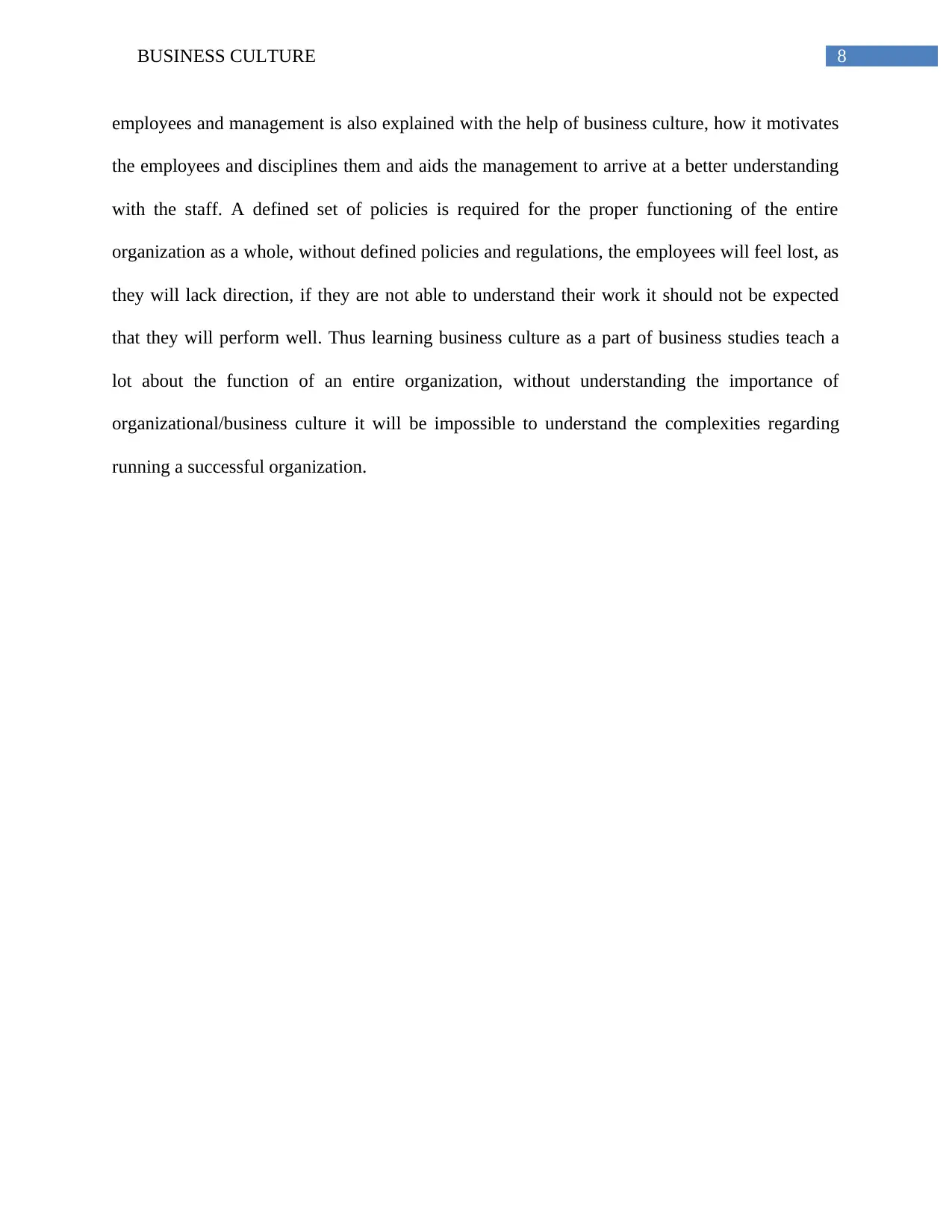
8BUSINESS CULTURE
employees and management is also explained with the help of business culture, how it motivates
the employees and disciplines them and aids the management to arrive at a better understanding
with the staff. A defined set of policies is required for the proper functioning of the entire
organization as a whole, without defined policies and regulations, the employees will feel lost, as
they will lack direction, if they are not able to understand their work it should not be expected
that they will perform well. Thus learning business culture as a part of business studies teach a
lot about the function of an entire organization, without understanding the importance of
organizational/business culture it will be impossible to understand the complexities regarding
running a successful organization.
employees and management is also explained with the help of business culture, how it motivates
the employees and disciplines them and aids the management to arrive at a better understanding
with the staff. A defined set of policies is required for the proper functioning of the entire
organization as a whole, without defined policies and regulations, the employees will feel lost, as
they will lack direction, if they are not able to understand their work it should not be expected
that they will perform well. Thus learning business culture as a part of business studies teach a
lot about the function of an entire organization, without understanding the importance of
organizational/business culture it will be impossible to understand the complexities regarding
running a successful organization.
⊘ This is a preview!⊘
Do you want full access?
Subscribe today to unlock all pages.

Trusted by 1+ million students worldwide
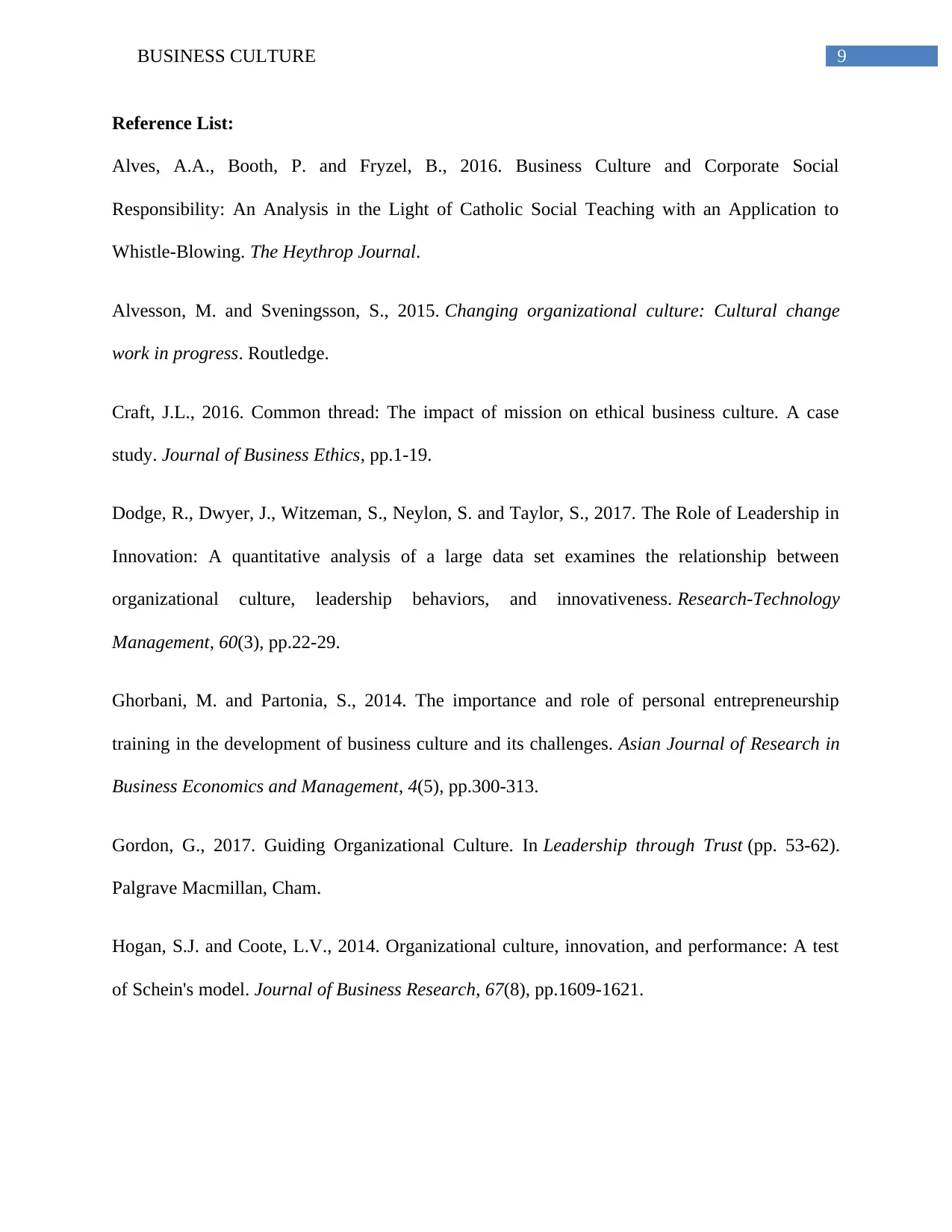
9BUSINESS CULTURE
Reference List:
Alves, A.A., Booth, P. and Fryzel, B., 2016. Business Culture and Corporate Social
Responsibility: An Analysis in the Light of Catholic Social Teaching with an Application to
Whistle‐Blowing. The Heythrop Journal.
Alvesson, M. and Sveningsson, S., 2015. Changing organizational culture: Cultural change
work in progress. Routledge.
Craft, J.L., 2016. Common thread: The impact of mission on ethical business culture. A case
study. Journal of Business Ethics, pp.1-19.
Dodge, R., Dwyer, J., Witzeman, S., Neylon, S. and Taylor, S., 2017. The Role of Leadership in
Innovation: A quantitative analysis of a large data set examines the relationship between
organizational culture, leadership behaviors, and innovativeness. Research-Technology
Management, 60(3), pp.22-29.
Ghorbani, M. and Partonia, S., 2014. The importance and role of personal entrepreneurship
training in the development of business culture and its challenges. Asian Journal of Research in
Business Economics and Management, 4(5), pp.300-313.
Gordon, G., 2017. Guiding Organizational Culture. In Leadership through Trust (pp. 53-62).
Palgrave Macmillan, Cham.
Hogan, S.J. and Coote, L.V., 2014. Organizational culture, innovation, and performance: A test
of Schein's model. Journal of Business Research, 67(8), pp.1609-1621.
Reference List:
Alves, A.A., Booth, P. and Fryzel, B., 2016. Business Culture and Corporate Social
Responsibility: An Analysis in the Light of Catholic Social Teaching with an Application to
Whistle‐Blowing. The Heythrop Journal.
Alvesson, M. and Sveningsson, S., 2015. Changing organizational culture: Cultural change
work in progress. Routledge.
Craft, J.L., 2016. Common thread: The impact of mission on ethical business culture. A case
study. Journal of Business Ethics, pp.1-19.
Dodge, R., Dwyer, J., Witzeman, S., Neylon, S. and Taylor, S., 2017. The Role of Leadership in
Innovation: A quantitative analysis of a large data set examines the relationship between
organizational culture, leadership behaviors, and innovativeness. Research-Technology
Management, 60(3), pp.22-29.
Ghorbani, M. and Partonia, S., 2014. The importance and role of personal entrepreneurship
training in the development of business culture and its challenges. Asian Journal of Research in
Business Economics and Management, 4(5), pp.300-313.
Gordon, G., 2017. Guiding Organizational Culture. In Leadership through Trust (pp. 53-62).
Palgrave Macmillan, Cham.
Hogan, S.J. and Coote, L.V., 2014. Organizational culture, innovation, and performance: A test
of Schein's model. Journal of Business Research, 67(8), pp.1609-1621.
Paraphrase This Document
Need a fresh take? Get an instant paraphrase of this document with our AI Paraphraser
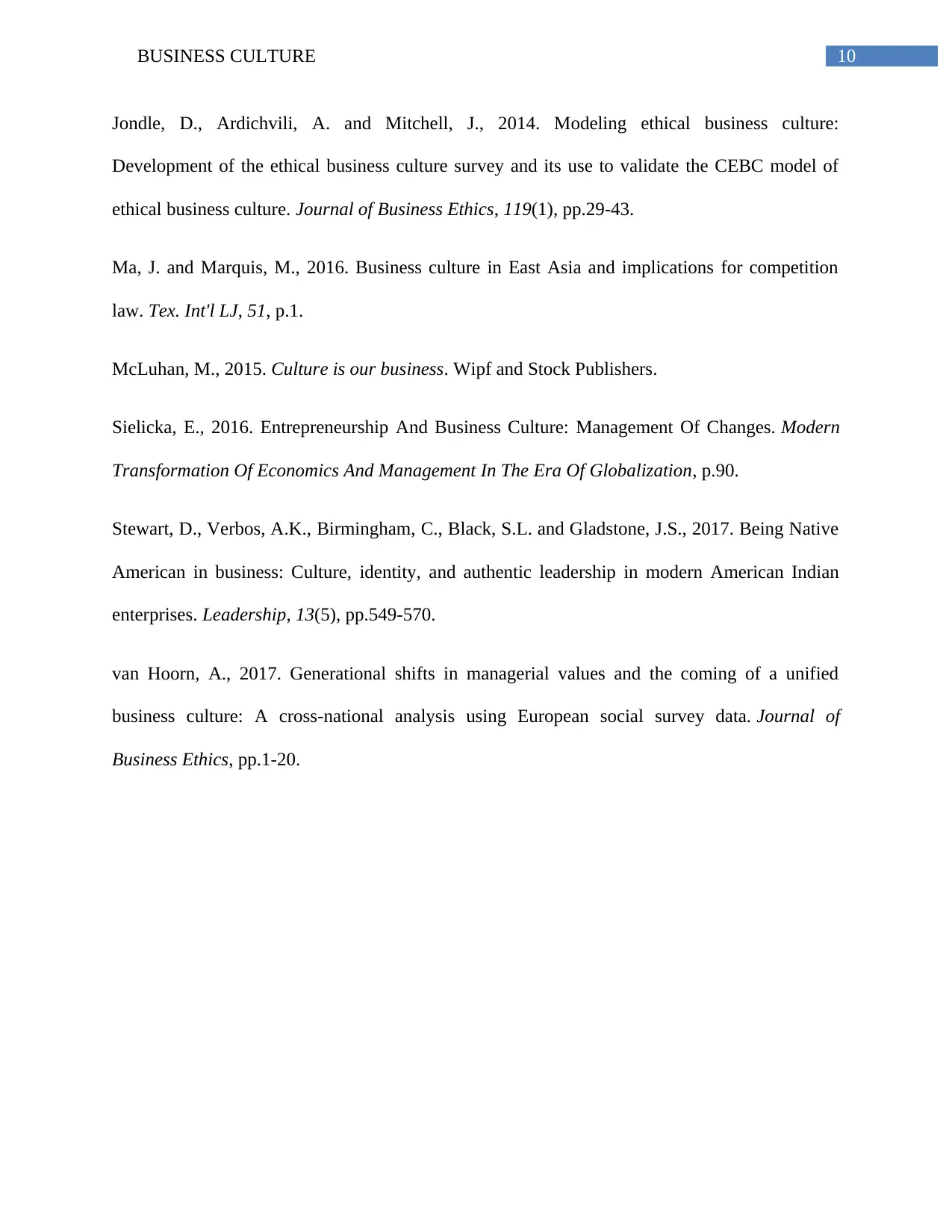
10BUSINESS CULTURE
Jondle, D., Ardichvili, A. and Mitchell, J., 2014. Modeling ethical business culture:
Development of the ethical business culture survey and its use to validate the CEBC model of
ethical business culture. Journal of Business Ethics, 119(1), pp.29-43.
Ma, J. and Marquis, M., 2016. Business culture in East Asia and implications for competition
law. Tex. Int'l LJ, 51, p.1.
McLuhan, M., 2015. Culture is our business. Wipf and Stock Publishers.
Sielicka, E., 2016. Entrepreneurship And Business Culture: Management Of Changes. Modern
Transformation Of Economics And Management In The Era Of Globalization, p.90.
Stewart, D., Verbos, A.K., Birmingham, C., Black, S.L. and Gladstone, J.S., 2017. Being Native
American in business: Culture, identity, and authentic leadership in modern American Indian
enterprises. Leadership, 13(5), pp.549-570.
van Hoorn, A., 2017. Generational shifts in managerial values and the coming of a unified
business culture: A cross-national analysis using European social survey data. Journal of
Business Ethics, pp.1-20.
Jondle, D., Ardichvili, A. and Mitchell, J., 2014. Modeling ethical business culture:
Development of the ethical business culture survey and its use to validate the CEBC model of
ethical business culture. Journal of Business Ethics, 119(1), pp.29-43.
Ma, J. and Marquis, M., 2016. Business culture in East Asia and implications for competition
law. Tex. Int'l LJ, 51, p.1.
McLuhan, M., 2015. Culture is our business. Wipf and Stock Publishers.
Sielicka, E., 2016. Entrepreneurship And Business Culture: Management Of Changes. Modern
Transformation Of Economics And Management In The Era Of Globalization, p.90.
Stewart, D., Verbos, A.K., Birmingham, C., Black, S.L. and Gladstone, J.S., 2017. Being Native
American in business: Culture, identity, and authentic leadership in modern American Indian
enterprises. Leadership, 13(5), pp.549-570.
van Hoorn, A., 2017. Generational shifts in managerial values and the coming of a unified
business culture: A cross-national analysis using European social survey data. Journal of
Business Ethics, pp.1-20.
1 out of 11
Related Documents
Your All-in-One AI-Powered Toolkit for Academic Success.
+13062052269
info@desklib.com
Available 24*7 on WhatsApp / Email
![[object Object]](/_next/static/media/star-bottom.7253800d.svg)
Unlock your academic potential
Copyright © 2020–2026 A2Z Services. All Rights Reserved. Developed and managed by ZUCOL.



